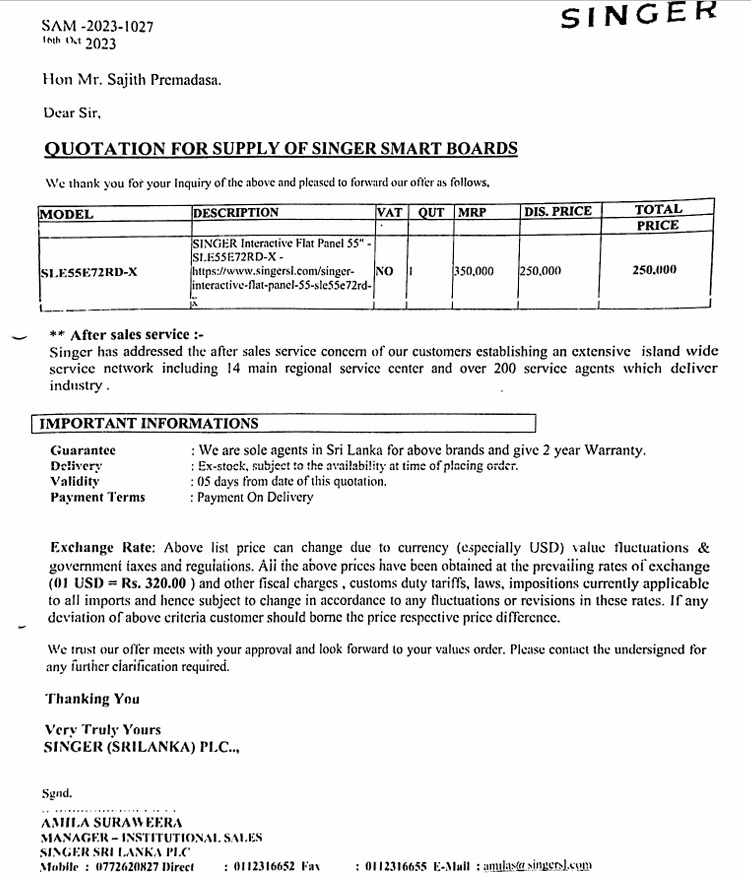-By A Special Correspondent

(Lanka-e-News - 09.Oct.2025, 11.00 PM) A flagship education initiative once touted as a beacon of digital progress in Sri Lankan classrooms has become mired in allegations of financial misconduct, inflated quotations, and corporate manipulation.
The “Sakwala Smart Board for Schools” programme, launched under the patronage of opposition leader Sajith Premadasa (SP), was intended to equip underprivileged schools with interactive smart boards through donor contributions. Instead, internal communications and whistleblower accounts now suggest the project became a lucrative commission scheme, implicating top officials of Singer Sri Lanka PLC and senior figures in the Samagi Jana Balawegaya (SJB) network.
According to sources familiar with the programme, the Sakwala initiative was coordinated by Amila Suraweera, who reported to Indika Gunatilaka, under the leadership of Mahesh Wijewardene, CEO of Singer Sri Lanka.
Both Mahesh and Indika are old boys of Royal College, Colombo. It is alleged that Indika used his connections with Mohan Pandithage, Chairman of Hayleys PLC, to exert influence over internal decision-making at Singer during the project’s execution.
Under Indika’s direction, Amila allegedly provided inflated quotations for smart boards to donors contributing through SP’s network. The markup, insiders claim, was understood to be reimbursed to SP as “commissions” for project facilitation.
For instance, while the actual cost of the smart boards was between Rs. 127,925 and Rs. 150,500 per unit, quotations were reportedly presented at Rs. 250,000 and Rs. 325,000. Major corporate donor Brandix paid the full inflated amounts, while other donors were invoiced inconsistently for identical products.
Since there was no formal public procurement process or third-party audit, the pricing irregularities went unchecked.
Singer’s internal accounting records show further discrepancies. While quotations were presented externally as Rs. 325,000, internal records occasionally reflected amounts such as Rs. 339,999, Rs. 349,999, or even Rs. 399,984 per unit.
According to one former executive, these “variations” were deliberately entered to inflate sales performance metrics, thereby qualifying managers for performance-based bonuses. “It was creative accounting disguised as smart marketing,” the source said. “No one wanted to question the numbers because the programme had political blessing.”
This conduct, if proven, would represent a serious breach of corporate governance under Colombo Stock Exchange (CSE) disclosure rules.
When the government changed in 2024 and the Sakwala programme was abruptly discontinued, Singer reportedly held a balance of Rs. 16,687,664 in a suspense account, believed to represent unspent or excess donor funds.
Under the prior informal arrangement, Singer could not reimburse these funds to SP’s team without raising questions. Following internal disputes, an SJB official allegedly contacted Singer’s CEO and a Director, flagging what he termed “unethical and unprofessional practices.”
Rather than conduct an open investigation, insiders say, Indika Gunatilaka attempted to downplay the matter. “He said it was a minor accounting issue,” a source said. “But this isn’t a private firm — Singer is a listed company bound by CSE’s corporate governance code.”
As pressure mounted, Singer’s senior management reportedly terminated Amila Suraweera’s employment, presenting him as solely responsible for the irregularities. Insiders argue that he had merely followed direct instructions from his superiors.
“This was a textbook example of scapegoating,” said a company insider. “Amila didn’t set the prices — the directives came from above.”
The decision, according to legal experts, may itself constitute a breach of the company’s duty of fair process and employment ethics.
In addition to the alleged commission scheme, accounting documents suggest VAT was paid only on the actual cost of the smart boards, not on the inflated selling prices charged to donors. Tax consultants say this discrepancy could amount to VAT evasion under Sri Lankan tax law, a criminal offence if proven intentional.
In a written response seen by The Times, Singer Sri Lanka PLC confirmed that 385 smart boards were delivered under the Sakwala programme in two phases:
Phase 1 (December 2021 – November 2023)
46 units @ Rs. 175,000 each → Rs. 8,050,000
Phase 2 (November 2023 – July 2024)
43 units @ Rs. 250,000 each
296 units @ Rs. 325,000 each
→ Total: Rs. 106,950,000
Combined expenditure for both phases was stated as Rs. 115 million.
Singer further stated that 326 signed debit notes had been obtained from recipients under Phase 2, with 13 still pending. Documents from Phase 1, they said, were archived and “require additional time for retrieval.”
The company also admitted that some deliveries under the Sakwala programme were “inadvertently debited” to Brandix Apparel Ltd., an existing customer account, instead of being recorded under the “Smart Boards for Schools Project.” An internal audit query is reportedly underway to determine the cause of the discrepancy.
“We assure you that Singer Sri Lanka PLC is committed to full transparency and accountability,” the company said in its statement, adding that “all necessary clarifications and reconciliations will be provided once the pending documentation is available.”
Whistleblowers maintain that the true balance in the suspense account may exceed Rs. 16.6 million, alleging that funds were withdrawn after the programme’s closure. Civil society watchdogs are now urging the Auditor General’s Department and the Securities and Exchange Commission (SEC) to open a formal inquiry into both Singer’s internal controls and the SJB-linked fundraising mechanism.
“This is not simply a political scandal,” said a governance analyst. “It’s a question of how corporate entities engage in political projects — and who benefits when the line between charity and corruption disappears.”
As of publication, Sajith Premadasa, Singer CEO Mahesh Wijewardene, and Indika Gunatilaka have not issued public comments on the allegations.
The Sakwala Smart Board affair now stands as a cautionary tale: a digital education dream turned into a case study of corporate complicity, political opportunism, and the price of blurred accountability in Sri Lanka’s public life.
-By A Special Correspondent
---------------------------
by (2025-10-09 22:30:41)
Leave a Reply